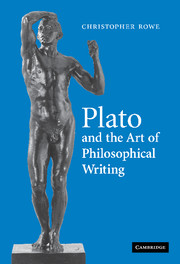Book contents
- Frontmatter
- Contents
- Preface
- Preliminaries: reading Plato
- THE DIALOGUES
- Introduction: The simile of the cave in the Republic
- 1 The Apology: Socrates' defence, Plato's manifesto
- 2 The Phaedo: Socrates' defence continued
- 3 ‘Examining myself and others’, I: knowledge and soul in Charmides, First Alcibiades, Meno, Republic, Euthyphro, Phaedrus
- 4 The moral psychology of the Gorgias
- 5 ‘Examining myself and others’, II: soul, the excellences and the ‘longer road’ in the Republic
- Appendix to Chapter 5: Socrates vs Thrasymachus in Republic I
- Interlude: A schedule of the genuine dialogues
- 6 Knowledge and the philosopher-rulers of the Republic, I: knowledge and belief in Book v
- 7 Knowledge and the philosopher-rulers of the Republic, II: the limits of knowledge
- 8 The Theaetetus, and the preferred Socratic–Platonic account of knowledge
- 9 The form of the good and the good: the Republic in conversation with other (‘pre-Republic’) dialogues
- 10 Republic and Timaeus: the status of Timaeus' account of the physical universe
- 11 Plato on the art of writing and speaking (logoi): the Phaedrus
- Epilogue: What is Platonism?
- Bibliography
- Index
2 - The Phaedo: Socrates' defence continued
Published online by Cambridge University Press: 22 September 2009
- Frontmatter
- Contents
- Preface
- Preliminaries: reading Plato
- THE DIALOGUES
- Introduction: The simile of the cave in the Republic
- 1 The Apology: Socrates' defence, Plato's manifesto
- 2 The Phaedo: Socrates' defence continued
- 3 ‘Examining myself and others’, I: knowledge and soul in Charmides, First Alcibiades, Meno, Republic, Euthyphro, Phaedrus
- 4 The moral psychology of the Gorgias
- 5 ‘Examining myself and others’, II: soul, the excellences and the ‘longer road’ in the Republic
- Appendix to Chapter 5: Socrates vs Thrasymachus in Republic I
- Interlude: A schedule of the genuine dialogues
- 6 Knowledge and the philosopher-rulers of the Republic, I: knowledge and belief in Book v
- 7 Knowledge and the philosopher-rulers of the Republic, II: the limits of knowledge
- 8 The Theaetetus, and the preferred Socratic–Platonic account of knowledge
- 9 The form of the good and the good: the Republic in conversation with other (‘pre-Republic’) dialogues
- 10 Republic and Timaeus: the status of Timaeus' account of the physical universe
- 11 Plato on the art of writing and speaking (logoi): the Phaedrus
- Epilogue: What is Platonism?
- Bibliography
- Index
Summary
Even a friendly reader, who knows his or her Plato, might at this point object that my argument has skirted at least one major obstruction that has the potential to wreck it: the Phaedo (not to mention the others; more of them in subsequent chapters). It is all very well, such a reader may say, to claim that Socrates and Plato are at one. But doesn't the Phaedo contradict this? In the Apology, Socrates exhibits a studied agnosticism towards the idea of his surviving after death (does he not?), whereas in the Phaedo he enthusiastically supports the idea, even at one point claiming to have proved it, before he is forced to retreat to a more moderate claim. What is more (the objection might continue), he uses the soul's survival as the basis for a picture of philosophy that seems literally a world apart from the one he presents in the Apology. Instead of philosophy's being the route to a better life in this world, in the Phaedo it becomes a means to a better existence after death, in which the philosopher may perhaps even go to live with the gods, escaping permanently from the cycle of death and rebirth to which, Socrates now suggests, the generality of the human race is condemned.
This is a formidable objection, and all the more formidable insofar as the perspective of the Phaedo has, historically, been taken as partly emblematic of Plato and Platonism.
- Type
- Chapter
- Information
- Plato and the Art of Philosophical Writing , pp. 96 - 121Publisher: Cambridge University PressPrint publication year: 2007



